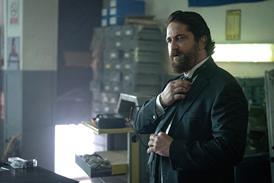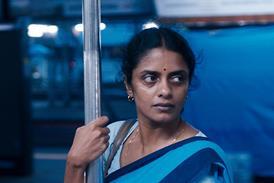Dir: Hideyuki Hirayama. Japan. 2003. 106mins
Hideyuki Hirayama's Samurai Resurrection has the flamboyant costumery, bravura swordplay and super-powered trickery of many a Hollywood sci-fi or fantasy epic, but served up with a distinctive Japanesque spin. It may not be ideal remake material, unless the re-makers figure out how to Westernise a martial arts fantasy set in medieval Japan, but it should travel well, particularly with its target young male demographic. Its story of resurrected Japanese Christians and their allies plotting the downfall of an anti-Christian Shogun has a bizarre originality (as well as real historical underpinnings) that can only add to its cult appeal.
Devout Christians, however, may take exception to the film's odd, if characteristically Japanese, depiction of their faith. The doctrine of resurrection gets mixed up with folk beliefs about vengeful spirits, with the resulting farrago dressed in the conventions of the kaidan (Japanese ghost story) and samurai swashbuckler and served up with plenty of CG effects. Probably not the film, in other words, to set the Bible Belt box office on fire, though it should do well in its home market (where only 1% of the population is Christian) following its April 26 opening.
Hirayama, whose last film, black comedy Out, was Japan's candidate for the 2003 foreign-language Oscar, returns to the fantasy/horror mode of his hit School ghost stories series. While delivering the action and effects scenes straight up, he directs with a lighter, surer touch than usual for this sort of fare. Meanwhile, the talented cast, led by Yosuke Kubozuka, Koichi Kato and Kumiko Aso, avoids turning their characters into either park statuary or cartoons - two of the standard options for actors in Japanese costume dramas. Samurai Resurrection, finally, is less a period thriller in the usual sense than a slickly produced, entertainingly offbeat role-playing game set to film.
The hero is Amakusa Shiro (Kubozuka), a young Christian who is slaughtered, together with 37,000 of his fellow believers and their sympathisers, by the forces of the Tokugawa Shogunate in the bloody Shimabara revolt of 1638.
A decade later, Tokugawa Yorinobu (Sugimoto), a lord of the Kishu Clan with aspirations for the Shogunate, encounters what looks to be a gorgeously kimonoed angel - Shiro returned to this world. Shiro tells Yorinobu that he will help him depose the despised Shogun Iemitsu, whose anti-Christian policy led to the Shimabara massacre. At first sceptical, Yorinobu is convinced when Shiro, aided by a beautiful and equally dead follower (Aso), resurrects a famed swordsman of the Yagyu School. For this miracle to occur, however, a young woman must die.
Two sisters and Yagyu disciples are then selected as human sacrifices for more unholy resurrections. They manage to avoid this dire fate, however, and when one tells Yagyu Jubei (Kato), the Yagyu leader, about the Kishu Clan plot, he is determined to thwart it, come what may. First, though, he has to get past a host of resurrected warriors. But how can a mere mortal defeat opponents who, having already tasted death, have no fear of it'
Based on a novel by Futaro Yamada, Samurai Resurrection is structured much like a role-playing game, with Jubei besting a series of opponents, each with different weapons and skills, before he finally confronts the 'boss' - Shiro. Also, though the fight scenes unfold more with traditional sword-play than flash acrobatics, the losers don't bleed, but electronically deliquesce, just as they do in the Final Fantasy video games.
That said, Kato brings a very human combination of determination and dismay to the role of Jubei, as he battles enemies who are no longer flesh-and-blood. Playing Amakusa Shiro, Kubozuka comes across as little more than a creepy cult leader, in a long-sleeved, high-collared costume that would not be out of place in a Star Wars episode. Kimiko has a stronger and sexier presence as Shiro's femme fatale follower, but her character is also less a credible Christian than a mad, bad spirit of Japanese folklore.
This is not to say the film maliciously distorts Christianity; instead it uses it (or rather misuses it) as a convenient bridge to the type of fantasy world most familiar to the local audience. What does Jesus - or Satan - have to do with it'
Prod cos: Toei, Kadokawa Shoten Publishing, NTV, Tokyo FM, Yomiuri TV, Nihon Shuppan Hanbai, Toei Video
Japan dist/int'l sales: Toei
Prods: Kazuhito Amano, Junji Akai, Jun Sato, Keita Seo, Hiro Deme
Scr: Sadoko Okudera
Cinematography: Katsumi Yanagijima
Music: Goro Yasukawa
Main cast: Yosuke Kubozuka, Koichi Kato, Kimiko Aso, Tetta Sugimotoe



















No comments yet